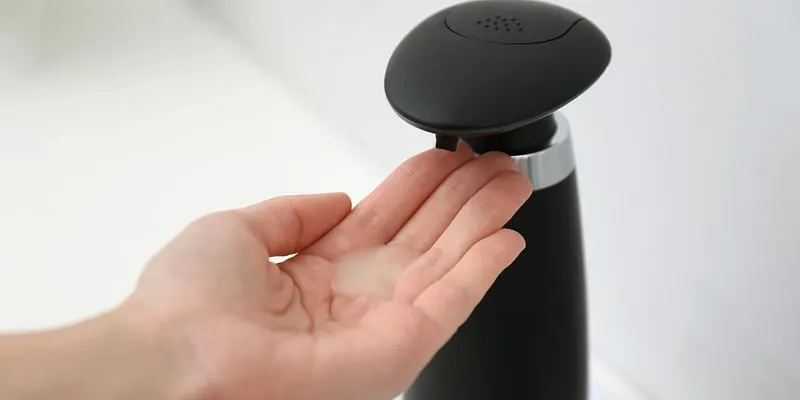From washroom automation to contactless sanitation, how Euronics is helping companies create a COVID-free environment
In an interaction with SMBStory, Viknesh Jain, founder of Gurugram-based Euronics, explains the role of COVID-19 in shaping consumer mindset towards washroom automation and contactless sanitation products.
The COVID-19 pandemic has increased the demand for contactless and touchless processes, products, and services, opening up new opportunities in automation.
Gurugram-based Euronics, founded in 2002 by Viknesh Jain, has been operating in this space for about two decades. The company manufactures and sells automated washroom accessories such as hand dryers, sensor taps, urinal sensors, soap dispensers, paper dispensers and more.
Among its clients are several Fortune 500 companies and tech giants including TCS, HCL, Wipro, IBM, Amazon, and more.
In the last one year, the demand for these products has increased by 40 percent, according to Viknesh. Moreover, much of this demand is coming from Tier II and III cities, he claims, which is why the company plans to expand to cities like Patna, Coimbatore, Siliguri, Ludhiana, and more, in this fiscal year.
Grand View Research estimates that the global smart bathroom market will grow at a CAGR of 10.5 percent between 2020 to 2027. Some of the prominent players in India include Jaquar, Parryware, Hindware, CERA Sanitaryware, and a few others.
In an interaction with SMBStory, Viknesh dives deeper into the trends in the sector and how these unprecedented times have played a major role in shaping consumer mindset towards washroom automation and contactless sanitation products.
Edited excerpts from the interview:
SMBStory [SMBS]: What was the opportunity you saw in the automated washroom accessories that compelled you to launch the business?
Viknesh Jain [VJ]: In the early 2000s, international companies were setting up their offices in India, which resulted in a demand for upper-class and elite office spaces that needed top-class washroom facilities.
A lot of American and European companies were providing washroom accessories but their prices were exorbitant because labour in these countries is very expensive. The margins added by distributors would also add to the cost. Seeing a lucrative opportunity, we launched Euronics in 2002.
SMBS: How did you bring down the cost of the products?
VJ: Initially, we used to design in India and get the products manufactured in China and Thailand. Cost labour is less in Asian countries when compared to the American and European ones.
Gradually, we started manufacturing some products in India in our facilities in Gujarat and Delhi-NCR. Additionally, we eliminated the need for distributors by directly selling to the companies. This helped us in bringing down the cost by 30-35 percent.

SMBS: Elaborate on the impact of COVID-19 on the demand for automated products.
VJ: For the longest time, automation was not used because of the cost. However, after the outbreak of the coronavirus pandemic, the demand for automated products has increased as nobody wants to touch anything.
Our business saw a 40 percent increase in the demand for these products in the last one year. Moreover, the sales we did in March and April 2020 combined were more than what we have done in the last 15 years.
Products like hand sanitation dispensers were hardly used. But now, their usage has become mandatory. We witnessed a 1,000X growth in their demand in the last one year.
Several corporates and big companies are spending money to make their premises compatible with the new normal. A lot of these companies have a ‘return to work budget’ wherein they are spending money on installing washroom automation and contactless sanitation products so as to ensure the safety and well-being of their employees in these unprecedented times when they return to the offices.
SMBS: Are small and medium businesses (SMBs) also following the bandwagon of the large companies in bringing about these changes within their organisations?
VJ: SMBs are price conscious but nevertheless, we have seen a surge in orders from them. Moreover, we have launched a low-price range of products between Rs 1,500- Rs 35,000 in the hand sanitation space which cater to micro, small, and medium businesses.
SMBS: You are planning to expand into many Tier II III locations. What spurred this move?
VJ: We are well-established in metros like Mumbai, Bangalore, Delhi, and more. Now, we are seeing a lot of opportunities in newer locations. There has been a lot of brain drain over the years wherein people have migrated out of smaller towns and cities and shifted to bigger cities and metros.
This trend is going to change, going forward as state governments are consciously making attempts to set up offices and industries in smaller cities. Moreover, the cost of land and labour is also less in Tier II and III cities.
We also see less or no competition. All these factors are driving us to explore these new places.
SMBS: Going forward, what are some of the new, innovative products you are coming up with in the automated washroom accessories space?
VJ: We are developing and planning to launch sanitary pads dispensing machines. These will be kiosks that will be installed near bus stops, metro stations, hospitals etc. We are also developing technology for this machine to generate notifications when the machine is running low so that the same can be refilled. We plan to collaborate with a few public and private sector enterprises and their CSR verticals for this initiative.
Additionally, we are also developing automatic bins, especially for sanitary pads disposal. This will be installed in women’s washrooms. You just wave your hand in front of the bin and the lid will open and the pad can be disposed of. These bins are airtight, which will also take care of the hygiene aspect.
Edited by Saheli Sen Gupta









